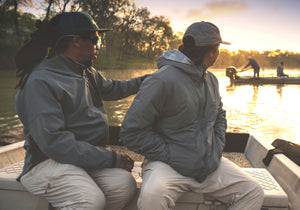Fly fishing is an art, a tradition, and for many, a way of life. Central to this angling adventure is the choice of gear, and among the essential items is the fly fishing net. Choosing the right net is not just about aesthetics; it's about functionality, durability, and suitability to the fishing environment. This article aims to guide you in selecting the ideal fly fishing net for your needs, ensuring you are well-equipped for your next fishing adventure.
Understanding Fly Fishing Nets
The Purpose of a Fly Fishing Net
A fly fishing net is crucial for safely landing fish without causing them harm. It helps to secure your catch, minimising the risk of losing it, especially in challenging conditions. A good net also aids in the catch and release process, ensuring the health and survival of fish populations.
Types of Fly Fishing Nets
Fly fishing nets come in various shapes and sizes, each suited to different fishing environments and species. The most common types include landing nets, boat nets, and rubber nets, each offering unique advantages.
Factors to Consider When Choosing a Fly Fishing Net
Size and Shape
The size and shape of the net should be appropriate for the fish you're targeting. Larger nets are suitable for bigger species, while smaller, more compact nets are ideal for stream fishing. The shape, whether it's teardrop, circular, or oval, can also influence ease of use and effectiveness.
Material
The material of the net plays a vital role in its longevity and functionality. Wooden nets offer a traditional look and feel, while aluminium nets are lightweight and durable. The netting material is equally important; rubber nets are gentle on fish and less prone to tangling.
Handle Length
The length of the net's handle should be considered based on your fishing style. Longer handles are great for boat fishing or when extra reach is needed, whereas shorter handles are more convenient for wading and close-quarters fishing.
Portability and Storage
For anglers on the move, a net that's easy to carry and store is essential. Collapsible or foldable nets are convenient for travel and storage, especially if space is limited.
Environmental Consideration
Choosing a net that minimises harm to fish is crucial, particularly for catch-and-release fishing. Look for nets with fish-friendly materials that reduce the removal of protective slime and decrease stress on the fish.
Practical Tips for Choosing Your Fly Fishing Net
Assess Your Fishing Environment
Consider the type of environment you'll be fishing in. For river fishing, a lighter, more manoeuvrable net might be ideal, while boat fishing in open waters might require a net with a longer handle and larger hoop size.
Think About Your Target Species
The species of fish you're targeting will largely dictate the size and type of net needed. Larger, stronger fish require sturdier nets with larger hoops, while smaller stream fish can be easily managed with a compact, lightweight net.
Check for Quality and Durability
Investing in a high-quality net pays off in the long run. Look for nets with sturdy construction, reliable materials, and a solid warranty. A well-made net will not only perform better but also last longer.
Read Reviews and Seek Recommendations
Utilise the experiences of fellow anglers. Online reviews, forums, and local fishing communities can provide valuable insights into the performance and reliability of different nets.
Consider Your Budget
Fly fishing nets range in price, and it's important to find a balance between quality and affordability. Determine a budget that works for you but remember that investing in a slightly more expensive, higher-quality net might be more cost-effective over time.
Conclusion
Selecting the right fly fishing net is a personal choice that depends on various factors, including the type of fishing, target species, and individual preferences. By considering the size, material, handle length, portability, and environmental impact, you can choose a net that not only complements your fishing style but also enhances your overall experience. Remember, the right net is not just a tool; it's a companion on your fly fishing journey.

